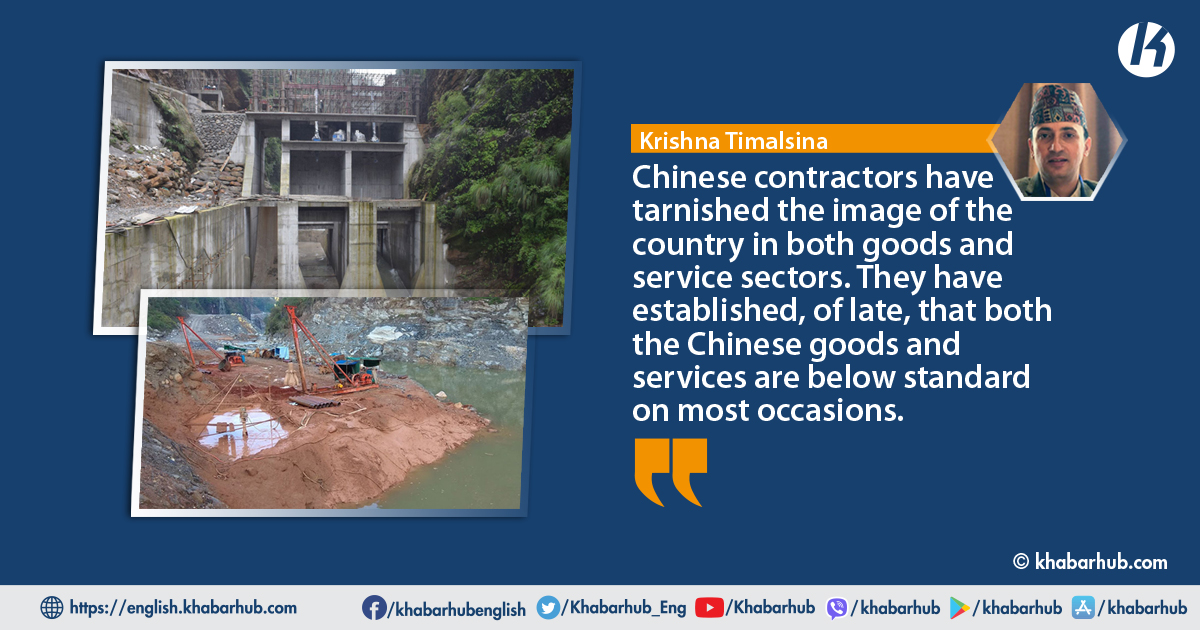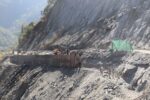KATHMANDU: When it comes to the quality of Chinese products, there is an established saying in Nepal, “Made in China, Aja chha, bholi chhaina”. That is, goods made in China are not reliable and Chinese products are of poor quality.
Following the deterioration of the global image, the Chinese government has announced that by 2025, its goods and services will be credible in a competitive market.
Despite the question of the quality of goods and services, the image of the Chinese contractor or construction company was good in Nepal.
The Chinese used to be known for quality and timely work. But now Chinese contractors are tarnishing their image both in the goods and service sectors.
The Chinese contractors selected and employed in the infrastructure construction project are conveying the message that they cannot work longer and cannot complete the work on time.
For this, it is necessary to review the projects that have been taken over, abandoned, or handed over as completed by the Chinese company.
In December 2018, the government made the Chinese company Huawei pay Rs 320 million fine. Huawei had agreed to start the CDMA project in 2011 and complete it by 2013.
However, it had to pay Rs 320 million from the contractor after the work was not completed by the end of 2018.
The equipment and technology introduced by the Chinese company in the name of Nepal Telecom’s 3G service expansion project are still being questioned for their low quality.
The Public Procurement Monitoring Office under the Office of the Prime Minister and Council of Ministers blacklisted two Chinese companies at the same time.
Both Shenzhen Forddok Electronics and HuiZhou ZhongCheng Electronics were blacklisted on the recommendation of the Nepal Electricity Authority.
The tarnishing of the image of the Chinese company is the result of a decline in the performance of selected contractors from China.
At that time, Shenzhen had won the contract for the construction of the New Bharatpur and Udayapur sub-stations under the Marsyangdi Corridor.
The NEA had recommended that the company be blacklisted by seizing the tender deposit of USD 7,000 after the company did not show interest in the required contract after bagging it due to the low price tender.
The delay in the construction of these two substations has affected the projects being constructed in Dordi and Marsyangdi river basins.
The power of the project was wasted for a long time after the transmission line was interrupted by a Chinese contractor.
Although the project itself constructed the required 3.5 km long transmission line to the sub-station, the 132 KV Kirtipur sub-station to be constructed by the Nepal Electricity Authority (NEA) was not constructed on time and the NEA had to bear the loss.
It was revealed that Deepak Bhatta, a Nepali agent affiliated with Shenzhen Forddok Electronics and Gejuwa Company, which has been occupying West Seti for eight years, had only worked on the construction of the transmission line by submitting the fake details.
Officials of the Nepal Electricity Authority nickname Dipak as ‘Pappu’ of the electricity sector.
The Marsyangdi-Kathmandu 220 KV double circuit transmission line, which was disrupted due to Chinese confusion, came into operation on June 17.
Similarly, Chinese company HuiZhou ZhongCheng Electronics did not supply electrical equipment including smart meters to NEA as per the agreement.
Soon after, the company was blacklisted on the recommendation of NEA. The company was blacklisted until July 2021 after it was found to have submitted fake documents while participating in the NEA contract.
Soon after, the authority awarded a contract to Chinese company Pinggao Wisdom Joint Venture for the design, supply, connection and operation of smart meters for customers under Ratna Park and Maharajgunj Distribution Center. However, the program to connect smart meters to the homes of 90,000 customers has not been completed yet.
The Chinese company has also caused a huge loss to NEA in the 25 MW solar energy project constructed with the assistance of the World Bank in Nuwakot.
The Chinese company Risen Energy had taken over the project saying that the foundation stone was laid in April 2018. However, only 17 MW of solar power has been connected to the national transmission system grid since last February.
Similarly, the Central China Power Grid International Economic Trade, which left the project nowhere due to extreme negligence in the construction of the Hetauda-Bharatpur-Bardaghat transmission line, is also on the blacklist of NEA.
Seizing Rs 300 million deposited as the performance guarantee by this company operated by Nepali agent Deepak Bhatt, NEA had initiated retendering for the contract process.
According to NEA, there is a long list of Chinese companies occupying important projects in Nepal. Only a few of them have been blacklisted.
NEA has warned the Chinese contractor Kwangsi Hydro and Electrical Construction, which has been entrusted with the 102 MW Madhya Bhotekoshi Hydropower Project in Sindhupalchowk, to blacklist, break the contract and make it pay fines if the work is not completed within the next five years.
According to Hariraj Neupane, chairman of Madhya Bhotekoshi Hydropower Company, the project will not be completed in the coming December due to the poor performance of the Chinese company Kwangsi Hydro.
According to NEA, there had been an agreement on the ‘Energy Cooperation Plan’ reached during the visit of Chinese President Xi Jinping to Kathmandu in October 2019, however, there has been no progress on it.
The project was said to be a starting point for enhancing cooperation in the energy sector.
Similarly, the Chinese company Power Construction Corporation of China Limited (PCCCL) has also abandoned the Tamor Reservoir Hydropower Project. As per the agreement with Hydro Electricity and Development Company of Nepal, the project has been put on hold only to prevent investment.
On the energy side, the Chinese company Zhejiang Yinlun had won the contract to expand the access to the generator supply, connection and transmission line to generate electricity from Kulekhani-III with a capacity of 14 MW.
However, the construction of the project was delayed due to the indifference of the Chinese company for a long time.
NEA blacklisted Chinese company Zhejiang Yinlun. NEA officials say that the cost of the Kulekhani III Hydropower Project has gone up due to the Chinese company.
The Chinese company China Gejuwa Water and Power Group also caused a huge loss to NEA in the Chameliya Hydropower Project. This was also due to the poor performance of the Chinese.
The Chinese contractor’s bad image is also linked to China Three Gorges International Corporation (CTGI). It started work in 2012 after getting the production license of the West Seti Hydropower Project.
However, the Chinese strategy of showing investment and construction commitment to Nepal’s projects and completing the trade mission by adding conditions after starting the work left West Seti unattended for 8 years.
According to the NEA records, the ill intention of the Chinese contractor can be spotted in the Dhalkebar substation.
The 400 KV substation at Dhalkebar, meant to link India with Nepal for the electric trade, was contracted by Central China Power Grid in 2014. However, NEA had to break the contract on September 22 and put the company on the blacklist after the Chinese company kept it on hold for a long.
The image of the Chinese company is not good even in the Tamakoshi hydropower project as Sino Hydro has extended the time for years.
Notoriety in roads and infrastructure
The Chinese contractor company is also responsible for pushing the well-known Melamchi drinking water project in limbo for years.
The Chinese company Railway Group, which was awarded the contract for the construction of the tunnel, broke the agreement unilaterally in August 2012 while constructing the tunnel.
After the project was abandoned and the company fled, the Italian contractor CMC resumed the work of Melamchi.
However, after the Italian company fled, arguing that the commission share was not agreed upon, now China’s Sino Hydro has again taken over the rest of the work.
Even though the work was supposed to be completed within 12 months, the company is still extending the contract of Melamchi citing the recent floods and landslides.
Despite making an agreement on the condition of paying a fine of Rs 1.25 million per day in case of further delay in work, not a single penny has been paid.
The Chinese company has been criticized for failing to make the Kalanki-Koteshwar section of the ring road, which was handed over four years ago, human-friendly.
It has been four years since the Government of Nepal signed an agreement with the Shanghai Construction Group of China to expand the Koteshwor-Kalanki road section.
Citing that the Chinese company has been putting forward conditions one after the other and the cost of the project was hiking due to the slackness of the contracted company, the Nepal government has approached the Chinese embassy to mount pressure on the company.
Now, if the Chinese team does not return, it will be blacklisted and the project will move ahead with another process, NEA source said.
The China State Construction Engineering Corporation, which won the contract by pledging the lowest amount for the construction of the Narayangarh-Butwal road section towards infrastructure, is also increasing the cost by adding conditions after conditions.
In three years after laying the foundation stone for the work, only 13 percent of work has been completed on the Narayangadh-Butwal road section under East-West Highway.
The then Prime Minister KP Sharma Oli had laid the foundation stone of the road extension from Rupandehi on March 22, 2019.
Although the contract demanded that the task should be completed within 42 months from the date of signing, only 13 percent of the 114 km road expansion project has been completed in 37 months.
The China State Construction Engineering Corporation has spent 37 months at the speed of a tortoise, despite the agreement to speed up the construction activities by dividing the task into two sections: 65 km Gaindakot-Daunne road as Section 1 and the Daunne-Butwal 49 km road as Section 2.
The Chinese company Guangdong Yuantian, which is breaking through the tunnel of the Bheri-Babai Multipurpose Diversion Project, has delayed the construction of the second package of the house, the surge track, and the dam with the bridge over the Bheri River.
Negligence in the aviation sector as well
The Chinese company has delayed the work not only in Nepal’s hydropower and infrastructure but also in the field of aviation.
The construction cost is increasing due to the lack of sincerity on the Chinese contractor’s part. Not only this the low quality of the projects handed over to Nepal has been a headache for the Nepal government.
According to the Civil Aviation Authority of Nepal (CAAN), China Shaanxi Construction Engineering, which was negligent in the construction of the airport, is still on the blacklist.
CAAN sources show that the construction of Gautam Buddha International Airport, which was supposed to be operational in 2017 by the Chinese contractor North West Civil Aviation Airport Construction, has been completed after five years of the designated time.
The Pokhara airport, which was expected to be completed in 2021, is in a dilapidated condition. The Pokhara airport, built by the Chinese company CAMC on a loan of US 214.7 million from the Chinese Import-Export Bank (EXIM), is not technically operational immediately. However, the government has already started paying 2 percent interest on the 75 percent Chinese loan.
CAAN officials say that China National Agro Technology International Engineering and Shaanxi Construction Engineering Group have done a satisfactory job in the runway expansion and improvement of Tribhuvan Airport.
The Chinese have completed the repair work of the airport, which was abandoned by the Spanish company SANJOSE Constructora for three years.
The Chinese contractor China State Construction Engineering Corporation and Poly Changda Construction Company, which were entrusted with the task of digging the Kathmandu-Tarai Madhes Fast track tunnel, were also suspended.
After the Chinese contractor, who had been assigned to the field in April 2021 to complete the construction within three years, neglected the construction of the tunnel and hybrid for a year, the main contractor broke the contract agreement of the Nepal Army and took action against the Chinese contractor.
Three Chinese were killed in an accident at Lendanda last month due to negligence on the part of a Chinese contractor. After the incident, Nepal Army dismissed the Chinese contractor.
Ambassador Hou Yanqi’s defense
After dozens of companies were blacklisted due to the negligence and slackness of the Chinese contractors working in the field of energy, infrastructure, and civil aviation, the Chinese Ambassador to Nepal Hou Yanqi organized a press conference on April 21 and tried to defend the Chinese side.
She noted that the failure of Chinese investors to build large projects and the negligence of contractors were due to a change of government here. She blamed the democracy and defended the Chinese contractors and blacklisted companies in the virtual conference called on April 21.
Ambassador Yanqi, who did not name any specific project, indirectly expressed dissatisfaction over the government’s removal of the China Gejuwa Group from the Budhigandaki Reservoir Hydropower Project.
The cabinet meeting held on April 7 had decided to build the Budhigandaki Reservoir Hydropower Project on its own without handing it over to Gejuwa.
This is the second time that a decision has been taken to remove Chinese company Gejuwa from the 1,200-MW project.
Earlier, the government led by Sher Bahadur Deuba, on November 13, 2017, had decided to revoke the agreement reached between the Ministry of Energy and Gejuwa on June 4, 2017, by the decision of the Council of Ministers.
However, the KP Oli-led government had decided to give the project to Gejuwa, reversing the previous decision of the Deuba government. After Gejuwa only intended to occupy the Budhigandaki project for four years, the government took over the project.
Projects such as the Kathmandu-Kerung interstate railway, Galchhi-Rasuwagadhi-Kerung transmission line, and Syafrubensi-Rasuwagadhi road section have fallen into disrepair due to China, which is looking at Nepal’s big projects in the basket of Belt and Road Initiative (BRI) and investing accordingly.
The Chinese Yunnan Xinhua Water Company, which held the 164-megawatt Kaligandaki Gorj hydropower project in April 2019, has not been in contact for long.
It has been five years since the Chinese company took over the much-talked-about 600 MW Upper Marsyangdi-2 hydropower project, which had been held in limbo by Indian company Grandhi Mallikarjuna Rao Energy for a decade.
During then Prime Minister KP Oli’s visit to China on June 21, 2019, a written agreement was reached with the Chinese company.
The construction work of the 30 MW Nyadi Hydropower Project on the Ngadi River at Bahundanda in Lamjung, which was started by the Chinese company Chachiang Hydropower Construction and Installation Company in April 2013, has been delayed.
The project has now reached the final stage. The Chinese have left the condition of the industrial park to be built in Jhapa in the same chaos.









Comment